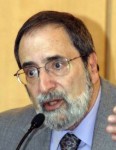Deceptive Practice: The Mysteries and Mentors of Ricky Jay, directed by Molly Bernstein and Alan Edelstein (USA: 2012); Opening Ken Cinema on May 24
By Laurie Baron

SAN DIEGO–You may not know the name Ricky Jay, but you will recognize his face and voice from numerous film voiceovers, roles in movies and television series, and appearances on late night and variety shows. At first glance he looks like a bearded version of comedian Louis Black, but his banter is more droll and less frenzied than Black’s. Rather than being the focal point of his act, humor serves primarily to contextualize the feats of magic he performs with cards and other objects and to distract the audience’s attention away from how he does them.
Born Richard Jay Potash, Ricky Jay has established himself as the most knowledgeable and skilled sleight of hand artist living today. Narrated by Dick Cavett, Deceptive Practice chronicles Jay’s lifelong immersion into the intricacies of prestidigitation. Jay likens this training to apprenticing with a martial arts sensei. His grandfather Max Katz played a formative role in teaching him magic and introducing him to the legendary Slydini who became Jay’s mentor. By the age of seven, Jay became the youngest magician to appear on television. Ricky frequented the New York magic shop owned by the Al Flosso who ended up instructing him on his craft as well. The only fond memory Jay has of his parents is that they hired Flosso to entertain at his bar-mitzvah. When his grandfather died, Ricky left home and severed his relationship with his mother and father. He does not confide anything more about his private life other than that he got married seven years ago.
The documentary alternates between the remarkable things Jay can do with a deck of cards and the histories of the master magicians like Max Malini, Dai Vernon, and Charlie Miller whose performing styles and tricks have deeply influenced his own repertoire. While viewers initially may wonder why he omits figures from the past like Harry Houdini or the present like David Copperfield, it gradually will dawn on them that the kind of small tricks he specializes in depend more on stealth observed in intimate settings like nightclubs and less on staging spectacular escapes or illusions in bigger venues.
Even if you are not a fan of magic, you will find it hard to resist marveling at the miracles materializing before your eyes. Jay holds the Guinness world record for the speed (clocked at 90 miles per hour) and distance (nearly 200 feet) he can throw a playing card. He demonstrates uncanny accuracy in targeting these cards and can boomerang them back to himself ad infinitum or cut them in half with a scissors as they swing back toward his hands. In one bit he tosses a card so hard that it pierces a watermelon rind and sticks. A British reporter who interviewed him over a lunch recalls with astonishment that during the course of the meal, he lifted his menu to unveil a large block of ice that clearly had not been there when they began eating. Yet she found no evidence of a trap door on the bottom of the table or melted water on the floor.
Jay literally holds his cards close to his vest. He never reveals how he manages to accomplish his deceptions. David Mamet, who directed the Broadway show and HBO special Ricky Jay and His Fifty-Two Assistants, compares Jay’s approach to transmitting his expertise to others to that of Talmudic scholars: “I’ll teach you anything if you don’t ask me anything.”
To enhance your appreciation of Jay’s talent, you might want to read Mark Singer’s article on him which was published The New Yorker. If it and this review have piqued your interest, see the movie as soon as possible. A documentary like this is like magic when it gets screened at a theatre. Now you see it; then you don’t.
*
Lawrence Baron recently retired from being the Nasatir Professor of Modern Jewish History at San Diego State University. He is the author of Projecting the Holocaust into the Present: The Changing Focus of Contemporary Holocaust Cinema (Rowman and Littlefield: 2005) and editor of The Modern Jewish Experience in World Cinema (Brandeis University Press: 2011). He may be contacted at lawrence.baron@sdjewishworld.com